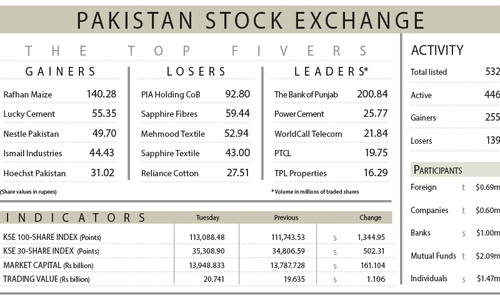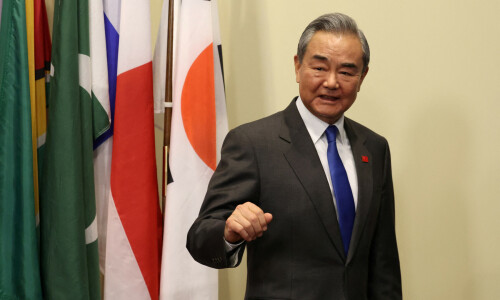 The arrival of eight vessels at Gaddani for dismantling may provide the much-needed breather to Pakistan’s ship-breaking industry which had been in a state of coma for the last about one decade following discriminating policies adopted by the past governments in order to protect the interests of steel-melting industrial units in the country.
The arrival of eight vessels at Gaddani for dismantling may provide the much-needed breather to Pakistan’s ship-breaking industry which had been in a state of coma for the last about one decade following discriminating policies adopted by the past governments in order to protect the interests of steel-melting industrial units in the country.
The cut in duties on import of ships for dismantling, coupled with other incentives, allowed by the present government, seems to be attracting entrepreneurs once again to an industry, which once provided jobs to over 30,000 persons directly and occupied the second top position amongst the international ship-breaking industry.
With new arrivals, the total number of ships now docked at the Gadani beach for dismantling has increased up to 11. As a result of the policy measures adopted by the government, including reduction in duty on scrap for ship-breaking from 15 per cent to 10 per cent, announced in the Federal Budget for 2001-2002, ship-breaking activities are picking up at a fast pace and resultantly the Gadani ship-breaking yard is rapidly progressing. These developments may provide new jobs to about 6,000 persons in the industry, which presently employs some 2,000 people.
The Finance Minister, Shaukat Aziz, during a visit to the Gadani ship-breaking yard in August this year, promised further incentives to ship-breakers if they could create 10,000 additional jobs.
The beach is about 50 km north-west of Karachi. Ship-breaking had started there much before Pakistan’s independence. But it registered a spectacular growth after the independence, enabling this industry to gate-crash into the club of top ship-breakers of the world by the mid-sixties.
In the eighties, the ship-breaking industry provided employment to over 30,000 workers directly, while over one-half of a million people earned their living indirectly, through trade and industries which used ship scraps as raw material. In 1985-86, the ship-breaking industry helped the country in making an annual saving of Rs1,500 million, which would otherwise have been spent on import of iron and steel. It also earned another Rs500 million in the foreign exchange through the export of surplus ship-scrap, second-hand machinery, generators, air-conditioners and other equipment. It contributed to the national exchequer, during that financial year, an amount of over Rs1,035 million in customs duty, sales tax and income-tax. The ship-breaking industry paid Rs2.69 billion in customs duty alone during the period July 1982 to June 1986.
The provincial government of Balochistan earned an annual income of Rs22 million through licence fees and lease money during those times. The Gadani Town Committee earned over Rs30 million, every year, through octroi duty during that period, making it Pakistan’s richest local body in terms of population-revenue ratio.
Prior to the independence, some casual businessmen occasionally used to break a few obsolete ships at Gadani. However, it was after the independence that a group of entrepreneurs made serious efforts to develop this casual trade into a regular industry. Gadani beach, however, at that time, lacked necessary infrastructure facilities: There were neither roads, nor utilities like electricity, drinking water or any arrangement for providing first aid or medical help to the workers.
The place—a nomadic hinterland — was uninhabited and consequently there was an acute shortage of labour. Majority of workers were unskilled and migratory. Even the businessmen, who entered the trade, possessed little know-how and knowledge of the industry, but they were infused with self-confidence and had realized that with the introduction of modern bulk carriers and the looming crisis in the international shipping industry, most of the outdated vessels would soon become redudant. Besides, as a result of initiation by many countries of a process of replacement of their unserviceable war ships with modern and sophisticated vessels, there appeared an international market for the sale of obsolete ships.
A number of other factors contributed to the rapid growth of the industry in Pakistan. Among others, a growing demand for iron and steel for the country’s rapidly developing re-rolling mills, engineering and other ancillary industries, which consumed iron, steel as well as other non-ferrous metals. The disruption of normal trade relations with India following 1965 and 1971 wars the supply of steel and iron products from Pakistan’s only steel mill at Chittagong stopped after the emergence of Bangladesh and massive devaluation of the rupee in 1972 made import of iron and steel products much costlier. This provided a chance to the ship-breaking industry to meet the national demand for raw material from the much cheaper ship-scrap.
Although the policy of nationalization, adopted by the government in 1972, discouraged investment in fixed assets and capital goods, but it gave a boost to the ship-breaking industry which being labour-intensive, needed neither fixed assets nor capital goods.
Realizing the importance of ship-breaking industry for the national economy, the government announced, in 1978, a number of measures to give a boost to this industry. These included: recognition of ship-breaking as an industry, declaring Gadani as a port, reduction in customs duty on ships imported for breaking, provision of telephone connections, increasing the lease period from one year to five years and appointment of an 8-member committee to solve other problems of the industry.
The years between 1969 and 1983 are considered to be the golden period of the ship-breaking industry. It was during this period that the ship-breaking activities witnessed a boom and this industry left many of its international rivals far behind as far as the total number of ships demolished and the tonnage of ship-scalp handled was concerned.















































Dear visitor, the comments section is undergoing an overhaul and will return soon.